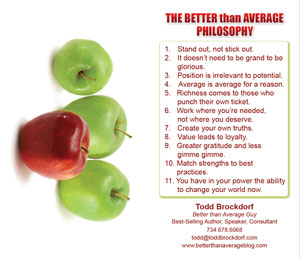 Need to find ways to be more productive at work? Overburdened and nearing burn out at the office due to overwhelming demands? Can’t possibly get everything done?
Need to find ways to be more productive at work? Overburdened and nearing burn out at the office due to overwhelming demands? Can’t possibly get everything done?
Disconnect.
But I am expected to be available, reachable, and connected, you say. But you are also expected to be productive. You are expected to get your work completed – on time and accurate. If you aren’t able to get your work done, how can you be productive?
Silence is the new noise. Turn down the distractions to turn up the production. When you really have to get something done now, disconnect.
The Better than Average use these workplace productivity tips daily to get more output, quicker results, and keep their sanity.
9 Ways to be More Productive at Work
- Close Your Email – Many surveys suggest that email is the number one workplace distraction. However, I’m guessing that “checking email” is not your primary job description. Email is not an urgent form of communication, so anyone who uses it as such doesn’t know how to properly communicate. Therefore, you shouldn’t need to incessantly check it. Nor jump every time a little bubble pops up in the lower right corner of your screen notifying you of a message. Close the inbox. Get your work done. If you need to respond to messages, find the “disconnect from server” setting and work offline while you compose your replies. Why do you need to instantly reply?
- Turn Off the Phones – Forward the phone to voicemail. Turn off the cell phone. There’s nothing like a ringing phone with a harried caller to redirect your attention from your work. They can leave a message. Or call back later. Or, better yet, call someone else. That kills two pigs with one bird – they are not squatting on your phone and you don’t need to return a call. What should go to voicemail?
- Close Your Browser – The grand thing about the Internet is that there are limitless distractions – news sites, social media sites, gossip sites, shopping sites, video sites, you name it. But when you are trying to get something done, the last thing you need to do it putter away your day distracted by the World Wide Web. Like a Pandora’s Box, once it is open, there is no stopping it. So don’t open the browser. Just…don’t…do…it. If you really have no discipline, get a program that will actually block you from opening the browser or limit your viewing to certain sites. Why do you need to see that status update right now?
- Shun Visitors – Tell them to go away. Nicely, of course. Offer a better time when they might be able to speak with you. Or have them send you a brief email about their needs. Take a rolling whiteboard and place it at the entrance of your cube to act as a door. Draw a knob if you are so inclined. If it is purely a social visit, explain that you are busy and offer to catch up later. They will understand. Was that last conversation important?
- Limit the List – If your To Do List reads longer than War and Peace, that’s a problem. Sure, we all have stuff that we need to do. But what needs to get done today? Limit the list to two to three main items. Do those items first when you arrive with a completion preferably before lunch. I try to put one main task on the list per day, with a usual maximum of two large tasks. If there are multiple, small critical tasks, I’ll let the list length slide to three or four. However, all of them should be able to be completed with relative confidence. As things arise throughout the day, they go on the longer term list, to be placed on future daily lists. What two items will you complete tomorrow?
- Be Selective – Do you really need to attend that meeting? Do you need to stay for the entire conference call or could you ask to go first, get your items out of the way and move on? Is someone else better suited to reply to that email? Are you letting others waste your time? Your time is valuable. Treat it as such. Scrutinize requests for your engagement. What is your time worth?
- Block Time – Put blocks of time in your calendar to get work done. When you look at the day ahead, if there are open slots, fill them with appointments with yourself. Use this time to crank out that project. Complete the items on your longer term To Do list. Think creatively for a moment. Whatever you need to do – use this time to get work done. Don’t allow people to schedule same-day meetings unless it is truly urgent. How much time do you have in your schedule now?
- Change the Scenery – Get outside of your cube. Go to the cafeteria. Or a conference room. Or a local Starbucks. Get away from the desk to help you focus on the work that needs to get done. If they can’t find you, they can’t distract you. It might even help you with creativity. Where will you hide?
- Run Away – If you are working on a large project and need extended time to focus on this output, take time away from your usual environment. Maybe work at home. Or at a hotel. Or at the library. Leave notifications that you will be out of the office working on a special project for the next few days. It will naturally keep the distractions down and minimize the additional burdens when you return. Where will you go?
Now, close your browser and go get something done.
(photo courtesy of Flower Factor on Flickr)
QUESTION FOR YOU –
Paraphrasing from Ferris Bueller, “What? You’re still here? Go on.”
SOMETHING FOR YOU –
For the awesome first chapter of the #1 best selling book Better than Average: Excelling in a Mediocre World, send an email to me and you score it for free!
_____
Todd Brockdorf
Better than Average Guy
#1 Best-Selling Author, Speaker, Thought Leader
[email protected]





